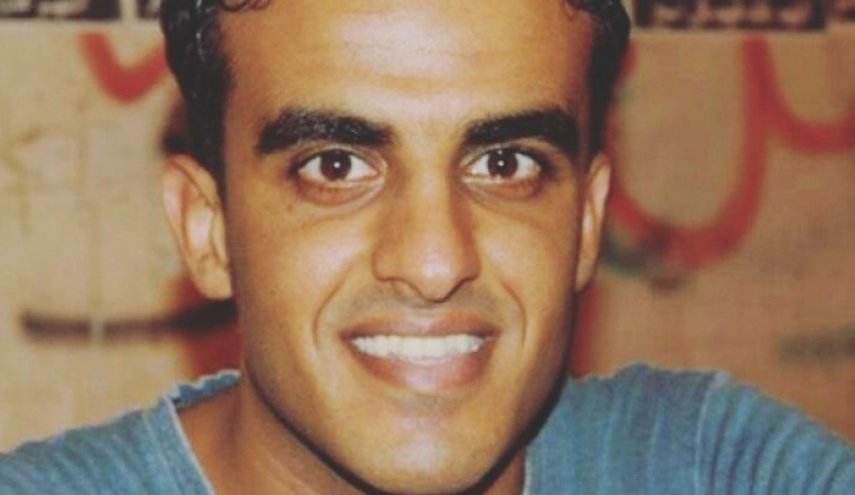Ali AlWazeer was 26 years old when he was arrested in 2014. At the time, he was unemployed. This was the third time Ali was arrested. After being interrogated and convicted in an unfair trial, Ali was imprisoned in Jau Prison, where he remains today.
Ali was arrested at Ansar Gallery complex after civilian and security intelligence forces surrounded the building. The authorities did not present an arrest warrant. Following his arrest, Ali was forcibly disappeared for 3 months. During this period, he was taken to the investigation building in Gudaibiya, where he was held in solitary confinement for 40 days in a small unsanitary cell. Then, he was taken to a different interrogation building, where he was shackled and blindfolded until he was finally transferred to Dry Dock Detention Center.
During the interrogation, Ali was subjected to different forms of torture. He was placed in a dark room and beaten on his back with a pipe. He suffered electric shocks on his genitals. Officers would also force him to imitate the sound of a duck and would proceed to torture him if the sound was not identical. They would also threaten him and his family. AlWazeer did not have access to an attorney. Eventually, he was coerced into signing a statement. Three months after his arrest, Ali was able to contact his family for the first time.
Ali was convicted in 3 separate cases, for which he was accused of detonating bombs and killing a migrant worker. The Court of Appeal overturned his conviction for the case in which he was accused of killing a migrant worker, but upheld the judgment of the other two cases. He has been sentenced to a total of 56 years in prison. Following the court judgment, Ali was transferred to Jau Prison.
In July 2020, Ali went on a contact strike along with inmates in Buildings 13 and 14 of Jau Prison to protest the prison administration’s mistreatment of prisoners. It was reported that inmates were being severely shackled, harassed during calls and visits, denied proper medical treatment, and prohibited from practicing their religion freely.
A month later, on 9 August, Ali took part in a hunger strike with inmates in Building 14. One of their main demands was guaranteeing their right to practice religious rituals freely. This was especially important given that Muharram, the most important month in the Islamic calendar, was fast approaching. The next day, Ali, along with 5 other prisoners, was transferred to Building 15 as a form of reprisal for mobilizing inmates to protest and strike. In Building 15, these prisoners were isolated; each prisoner would be placed in a cell with three migrant workers who do not share their language or culture and would be allowed an hour in the yard at separate times. As a result, they were unable to communicate with each other nor the outside world and they could not collectively practice rituals for Muharram.
On 29 August, on the ninth day of Muharram, Ali and an officer of Yemeni nationality were in an altercation after the officer insulted and pushed Ali, provoking Ali to push him back and thus injuring the officer. Following the incident, Ali was severely beaten and taken from his cell to the Academy where he was tortured. He was then transferred to the CID where the interrogation continued and Ali was accused of assault. Ali was then held incommunicado at Building 2 of Jau Prison where there is no surveillance.
In Building 2, Ali was severely tortured on a daily basis. He was shackled to an iron bed by his hands and legs for 7 days and was not allowed to go to the bathroom. He was beaten and handcuffed from behind his back even whilst standing up.
On 14 September, Ali was seen at the prison clinic for the first time since he was taken from his cell on 29 August. He appeared to be in a critical condition: his face and body were bruised and bloodied, his arm appeared to be broken and he could not speak. Ali was then taken to Building 23 where he was placed in solitary confinement.
Ali’s family had received calls from Ali telling them that he was okay. Subsequently, his family received shocking news from inmates at the prison, informing them of his torture. Ali’s family submitted multiple complaints regarding his torture in August and September. They were able to contact their son, however, he was unable to speak freely during calls because he would often be supervised by officers. Despite this, an investigation has yet to be opened concerning Ali’s torture. The family has also been trying to provide Ali with the shoulder brace he requested. His shoulder was dislocated due to the beatings he endured, but the administration has yet to contact the family as promised in order to receive and deliver the brace to Ali, who is still in pain.
AlWazeer’s arbitrary arrest, trial without legal counsel, and coerced confession all constitute a violation of his due process and fair trial rights as well as the International Covenant for Civil and Political Rights (ICCPR). Additionally, the severe torture which AlWazeer endured during his detention and his imprisonment constitutes a violation of the Convention Against Torture (CAT) and the Bahraini constitution.
ADHRB calls upon Bahrain to uphold its human rights obligations by annulling Ali’s conviction and ensuring that any subsequent retrial is consistent with due process and fair trial rights. We also urge authorities to investigate claims of torture and ill treatment by prison officials in order to hold these officials accountable. Furthermore, ADHRB urges authorities to provide Ali with the necessary medical treatment for the injuries he sustained as a result of torture and to ensure that his family are aware of his whereabouts and wellbeing.





